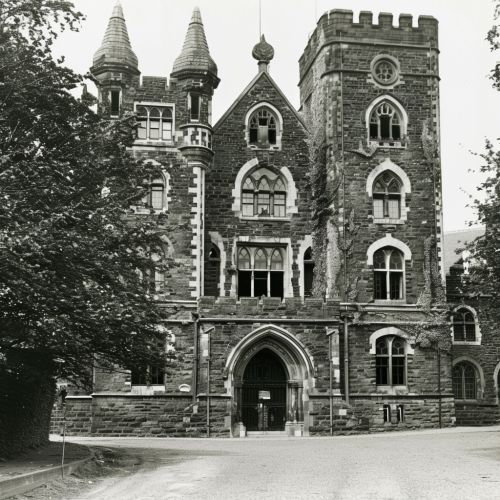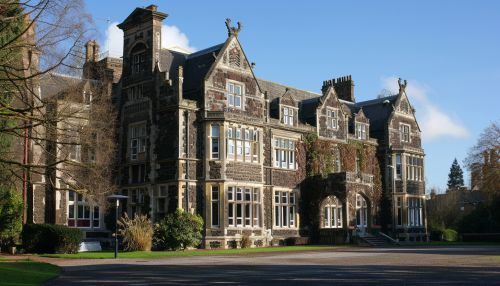Glyn Daniel: Difference between revisions
No edit summary |
No edit summary |
||
| Line 2: | Line 2: | ||
Glyn Edmund Daniel was born on 23 April 1914 in Barry, Vale of Glamorgan, Wales. He was the son of William John Daniel, a schoolmaster, and his wife, Annie. Daniel was educated at Barry County School and then at [[University College, Cardiff]], where he studied classics and played rugby. He graduated with a first-class degree in 1935. | Glyn Edmund Daniel was born on 23 April 1914 in Barry, Vale of Glamorgan, Wales. He was the son of William John Daniel, a schoolmaster, and his wife, Annie. Daniel was educated at Barry County School and then at [[University College, Cardiff]], where he studied classics and played rugby. He graduated with a first-class degree in 1935. | ||
[[Image:Detail-78807.jpg|thumb|center|A historical building of University College, Cardiff.]] | [[Image:Detail-78807.jpg|thumb|center|A historical building of University College, Cardiff.|class=only_on_mobile]] | ||
[[Image:Detail-78808.jpg|thumb|center|A historical building of University College, Cardiff.|class=only_on_desktop]] | |||
In 1936, Daniel won a scholarship to [[St John's College, Cambridge]], where he began his studies in archaeology. He was particularly influenced by the work of [[Gordon Childe]], a prominent archaeologist of the time. Daniel completed his PhD in 1940, with a dissertation on the prehistoric archaeology of the Iberian Peninsula. | In 1936, Daniel won a scholarship to [[St John's College, Cambridge]], where he began his studies in archaeology. He was particularly influenced by the work of [[Gordon Childe]], a prominent archaeologist of the time. Daniel completed his PhD in 1940, with a dissertation on the prehistoric archaeology of the Iberian Peninsula. | ||
Revision as of 17:50, 15 May 2024
Early Life and Education
Glyn Edmund Daniel was born on 23 April 1914 in Barry, Vale of Glamorgan, Wales. He was the son of William John Daniel, a schoolmaster, and his wife, Annie. Daniel was educated at Barry County School and then at University College, Cardiff, where he studied classics and played rugby. He graduated with a first-class degree in 1935.


In 1936, Daniel won a scholarship to St John's College, Cambridge, where he began his studies in archaeology. He was particularly influenced by the work of Gordon Childe, a prominent archaeologist of the time. Daniel completed his PhD in 1940, with a dissertation on the prehistoric archaeology of the Iberian Peninsula.
Career
After completing his PhD, Daniel served in the Royal Air Force during World War II. After the war, he returned to Cambridge, where he became a lecturer in archaeology. In 1956, he was appointed Disney Professor of Archaeology, a position he held until his retirement in 1974.
Daniel was a prolific writer and editor. He wrote numerous books on archaeology, including "The First Civilizations" (1968) and "The Idea of Prehistory" (1962). He also edited the academic journal Antiquity from 1958 to 1986, and the popular magazine Current Archaeology from 1967 to 1986.
In addition to his academic work, Daniel was well known for his appearances on the television quiz show Animal, Vegetable, Mineral?. He appeared on the show from 1952 to 1959, and his charismatic personality helped to popularize archaeology with the general public.
Contributions to Archaeology
Daniel's work significantly contributed to the field of archaeology. His research on the prehistoric archaeology of the Iberian Peninsula was groundbreaking and remains influential today. His books, particularly "The First Civilizations" and "The Idea of Prehistory", are considered classics in the field.
As an editor, Daniel played a crucial role in shaping the direction of archaeological scholarship. Under his editorship, Antiquity became one of the leading journals in the field. His work with Current Archaeology helped to bridge the gap between academic archaeology and the interested public.
Daniel was also instrumental in promoting archaeology as a discipline within the university system. As Disney Professor of Archaeology at Cambridge, he helped to establish archaeology as a respected academic discipline.
Personal Life and Legacy
Daniel married Ruth Evelyn Martin in 1947. The couple had two children. Daniel was known for his love of rugby and was a lifelong supporter of the Welsh national team.
Daniel died on 13 December 1986. His contributions to the field of archaeology continue to be recognized today. The Glyn Daniel Prize, awarded by the Prehistoric Society for the best undergraduate dissertation in prehistoric archaeology, is named in his honor.
